CURRENT CONTENTS:
STDs (sexually transmitted diseases)
Weighing anchor
Latent syphilis
Tabes dorsalis (tertiary syphilis)
GPI (general paresis of the insane)
Gon-dom / condoms
Monkeypox
Authors' Note:
weigh anchor: opposite of 'drop anchor', a naval expression for the last step taken in preparation before the ship leaves port
The symptoms of primary syphilis most often involve genital skin lesions, or chancres, that appear an average of three weeks after contracting the disease, caused by Gram-negative bacteria in the spiroch(a)ete family. Some patients, however, will remain without symptoms until the later stages of the disease develop insidiously.
Authors' Note: VDRL (initialism for venereal disease research laboratory): a screening blood test for syphilis developed in 1906 and updated in 1946
Syphilis is sometimes referred to medically as lues, accounting for the choice of name for our protagonist.
This verse, dealing with the asymptomatic latent stage, follows the author’s verse ‘chancre’, a manifestation of the early (‘primary’) stage. Treatment with penicillin at either of these stages is dramatically effective at preventing the dire consequences of progression to symptomatic late (‘tertiary’) disease.
Authors' Note:
CNS: central nervous system, i.e. the brain and spinal cord; a commonly used medical initialism
spirochete(n.): a generalization for a bacterium of the type that causes syphilis (Treponema pallidum), based on its microscopic appearance
spirochete(v.): novel use confined to this verse, implying damage by syphilitic spirochetes
The above verse, dealing with the late or ('tertiary') manifestations of syphilis (a.k.a. lues), emphasizes the common disorders of the CNS, including tabes dorsalis, a disease of the spinal cord producing sensory limitations in the legs, compensated by a characteristic (tabetic) stomping gait. Accompanying brain disorders may include general paresis (weakness), mania, delirium and dementia; and manifestations in other organ systems are not uncommon.
This verse also relates to a series on organic causes of neuropsychiatric symptoms, such as hypothyroid depression, and frontal meningioma.
Authors' Note: These lyrics are intended to be sung in rap format.
Life-threatening medical aspects of the often-discounted STD (sexually transmitted disease) gonorrhea are well described in the Author's Note to SheilaB’s verse ‘Chaldaea’.
Gonorrheal infection of the external genitalia, caused by the bacterium Neisseria gonorrhoeae, may also result in pelvic inflammatory disease in females, epididymitis in males, and chronic infertility. Transmission of the disease is prevented by condoms.
it would find a new name for 'monkeypox', to de-emphasize its overstated enzootic connection.
Here's a LIST OF LINKS to collections of intriguing poems (over 200 of these!) on medical/dental topics, updated to December 2024.
GENERAL DIRECTIONS FOR WEB-EXPLORERS:
To resume the sequence of daily titillations on our related blog "Daily Illustrated Nonsense", click HERE. Once you arrive, you can select your time frame of interest from the calendar-based listings at the bottom of the page, and check the daily offerings for any month from the start of 2020 until December 2024.
As of December 2024, there are 1800 unique entries available on the daily blog, displaying individual poems (often illustrated) and wordplay, but also with some photo-collages and parody song-lyrics. Most of their key elements are also presented here on "Edifying Nonsense" in topic-based collections, such as this one. The "Daily" format also has the advantage of including some song-lyrics, videos and other material that are not shown here on this topic-based blog.







No comments:
Post a Comment